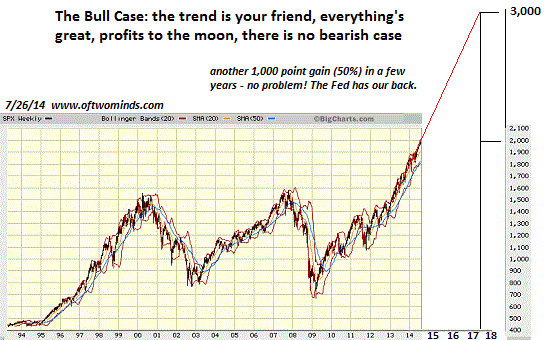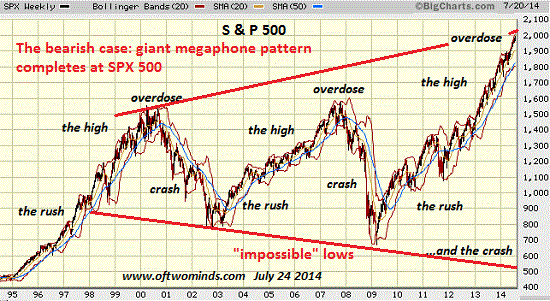Which appears more likely--a straight-line extension of the past two years' rise in stocks, or another "impossible" decline to complete the megaphone pattern?
There are dozens of charts and data points supporting the case for a continuation of the Bull market in stocks or a reversal into a Bear market. For the sake of brevity I've distilled the two arguments into two charts, one for the Bull case and one for the Bear case.
The Bull case is easy: the economy has reached self-sustaining expansion, a.k.a. escape velocity; hotel occupancy rates are high, home valuations are rising, stocks are fairly valued based on forward earnings, debt has been paid down/written off, and the Fed has tapered its quantitative easing (QE) bond and mortgage buying with no ill effect.
Looking ahead, there is no fundamental or technical reason for stocks to drop significantly; stocks always go up in years ending in 5, and there is nothing magical about 2016 in terms of a decline, either. The market could advance for years.
Bottom line: the advance since early 2012 is founded on solid fundamentals and there's no reason the advance can't continue along with strengthening fundamentals such as corporate profits, rising tax revenues, etc.
The Bear case is based on sentiment, but this reliance on extremes of bullish sentiment is misplaced; the fact that everyone is talking about a bubble in stocks and expecting a correction just goes to show there is no bubble and a correction will simply offer another opportunity to buy the dip, a strategy that has been richly rewarded.
The Fed (and other central banks) have our back: any decline in risk assets will be washed away with another tsunami of near-zero-interest money, liquidity and credit.
The Bear Case is also simple: the supposedly solid fundamentals of earnings, stock buybacks, etc. are all based on an unprecedented expansion of debt, central bank monetary easing, leverage and systemic risk.
Finance trumps economic data, and financial risk has reached a tipping point:shadow banking is unraveling in China, the Fed already owns most of the new home mortgages that have been issued and has to taper lest it own the entire mortgage/Treasury markets, junk bonds have been bid to the moon, etc.
Debt, leverage and risk have reached bubble heights, and simple cause and effect means the stock market has also reached bubble heights.
Faith in the central banks' ability and willingness to push stock markets higher has reached extremes. Volatility and complacency have both reached levels that historically correspond to major highs.
Take away massive buybacks funded by cheap credit and the market's dependence on financial one-offs will be revealed: the Bull market was never about earnings; it was always about cheap credit, central banks pushing investors into risk assets like stocks and corporate buybacks. Bulls claiming hotel bookings, auto sales and profits are "proof" of a self-sustaining economy are looking at the effects, not the causes.
To understand the cycle of credit addiction, please read Are We Addicted to Failure?
Bulls and Bears alike tend to marry their convictions. As we all know, the human mind is uncomfortable with uncertainty, and so once a person chooses the Bull case, recency bias and confirmation bias kick in and the Bull selects recent data that confirms his conviction.
The same tropism toward certainty takes hold of Bears, and those of us without the conviction of marriage watch from the sidelines.
I have long been skeptical of the Bull case based on the unprecedented scale of central bank/state intervention, support and manipulation. If everything's so great, then why does the Fed need to buy trillions of dollars in assets and manipulate markets with reverse repos, etc. and direct purchases via proxies? If a market only rises as a result of such outlandish one-off intervention, how can anyone claim it has any fundamental foundation?
Which appears more likely--a straight-line extension of the past two years' rise in stocks, or another "impossible" decline to complete the megaphone pattern? If stocks continue climbing once the Fed ends its bond-buying in and stock buybacks drop to less frenzied levels, that will be evidence the Bulls are right about the economy's escape velocity.
If the market tanks as soon as the monetary heroin is withdrawn, that will support the Bear's case that financial legerdemain trumps economic data.
Two things favor the Bear case in my view: if volume is the weapon of the Bull (i.e. rising volume drives Bull markets), then the fact that volume has been declining for years is not supportive of the Bulls.
Secondly, I don't see how the economy can reach escape velocity with household income declining in real terms: Five Decades of Middle Class Wages (Doug Short).
- English (UK)
- English (India)
- English (Canada)
- English (Australia)
- English (South Africa)
- English (Philippines)
- English (Nigeria)
- Deutsch
- Español (España)
- Español (México)
- Français
- Italiano
- Nederlands
- Português (Portugal)
- Polski
- Português (Brasil)
- Русский
- Türkçe
- العربية
- Ελληνικά
- Svenska
- Suomi
- עברית
- 日本語
- 한국어
- 简体中文
- 繁體中文
- Bahasa Indonesia
- Bahasa Melayu
- ไทย
- Tiếng Việt
- हिंदी
The Case For A Bull Or Bear Market In Two Charts
Published 07/28/2014, 02:04 AM
Updated 07/09/2023, 06:31 AM
The Case For A Bull Or Bear Market In Two Charts
3rd party Ad. Not an offer or recommendation by Investing.com. See disclosure here or
remove ads
.
Latest comments
Install Our App
Risk Disclosure: Trading in financial instruments and/or cryptocurrencies involves high risks including the risk of losing some, or all, of your investment amount, and may not be suitable for all investors. Prices of cryptocurrencies are extremely volatile and may be affected by external factors such as financial, regulatory or political events. Trading on margin increases the financial risks.
Before deciding to trade in financial instrument or cryptocurrencies you should be fully informed of the risks and costs associated with trading the financial markets, carefully consider your investment objectives, level of experience, and risk appetite, and seek professional advice where needed.
Fusion Media would like to remind you that the data contained in this website is not necessarily real-time nor accurate. The data and prices on the website are not necessarily provided by any market or exchange, but may be provided by market makers, and so prices may not be accurate and may differ from the actual price at any given market, meaning prices are indicative and not appropriate for trading purposes. Fusion Media and any provider of the data contained in this website will not accept liability for any loss or damage as a result of your trading, or your reliance on the information contained within this website.
It is prohibited to use, store, reproduce, display, modify, transmit or distribute the data contained in this website without the explicit prior written permission of Fusion Media and/or the data provider. All intellectual property rights are reserved by the providers and/or the exchange providing the data contained in this website.
Fusion Media may be compensated by the advertisers that appear on the website, based on your interaction with the advertisements or advertisers.
Before deciding to trade in financial instrument or cryptocurrencies you should be fully informed of the risks and costs associated with trading the financial markets, carefully consider your investment objectives, level of experience, and risk appetite, and seek professional advice where needed.
Fusion Media would like to remind you that the data contained in this website is not necessarily real-time nor accurate. The data and prices on the website are not necessarily provided by any market or exchange, but may be provided by market makers, and so prices may not be accurate and may differ from the actual price at any given market, meaning prices are indicative and not appropriate for trading purposes. Fusion Media and any provider of the data contained in this website will not accept liability for any loss or damage as a result of your trading, or your reliance on the information contained within this website.
It is prohibited to use, store, reproduce, display, modify, transmit or distribute the data contained in this website without the explicit prior written permission of Fusion Media and/or the data provider. All intellectual property rights are reserved by the providers and/or the exchange providing the data contained in this website.
Fusion Media may be compensated by the advertisers that appear on the website, based on your interaction with the advertisements or advertisers.
© 2007-2024 - Fusion Media Limited. All Rights Reserved.
